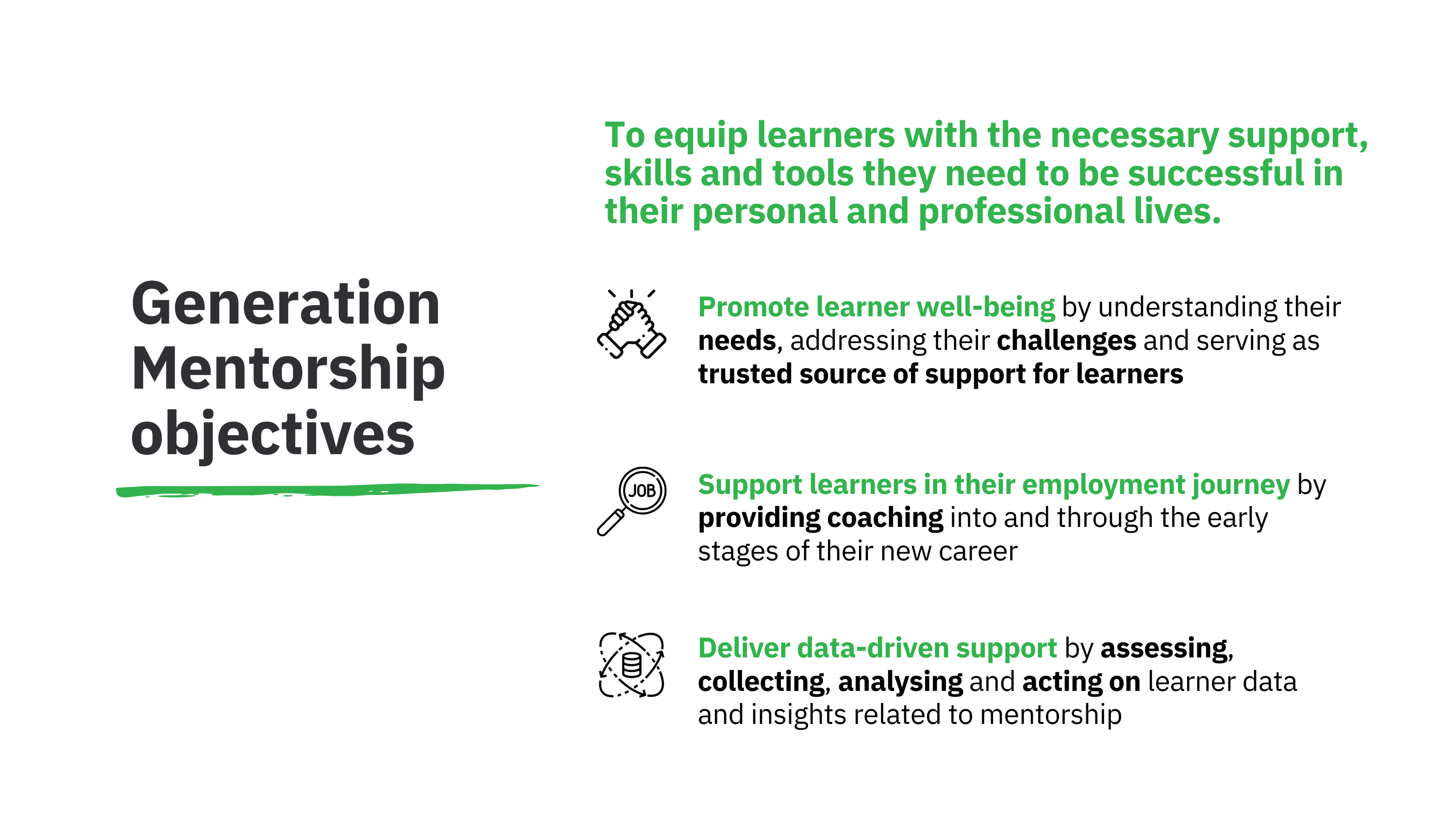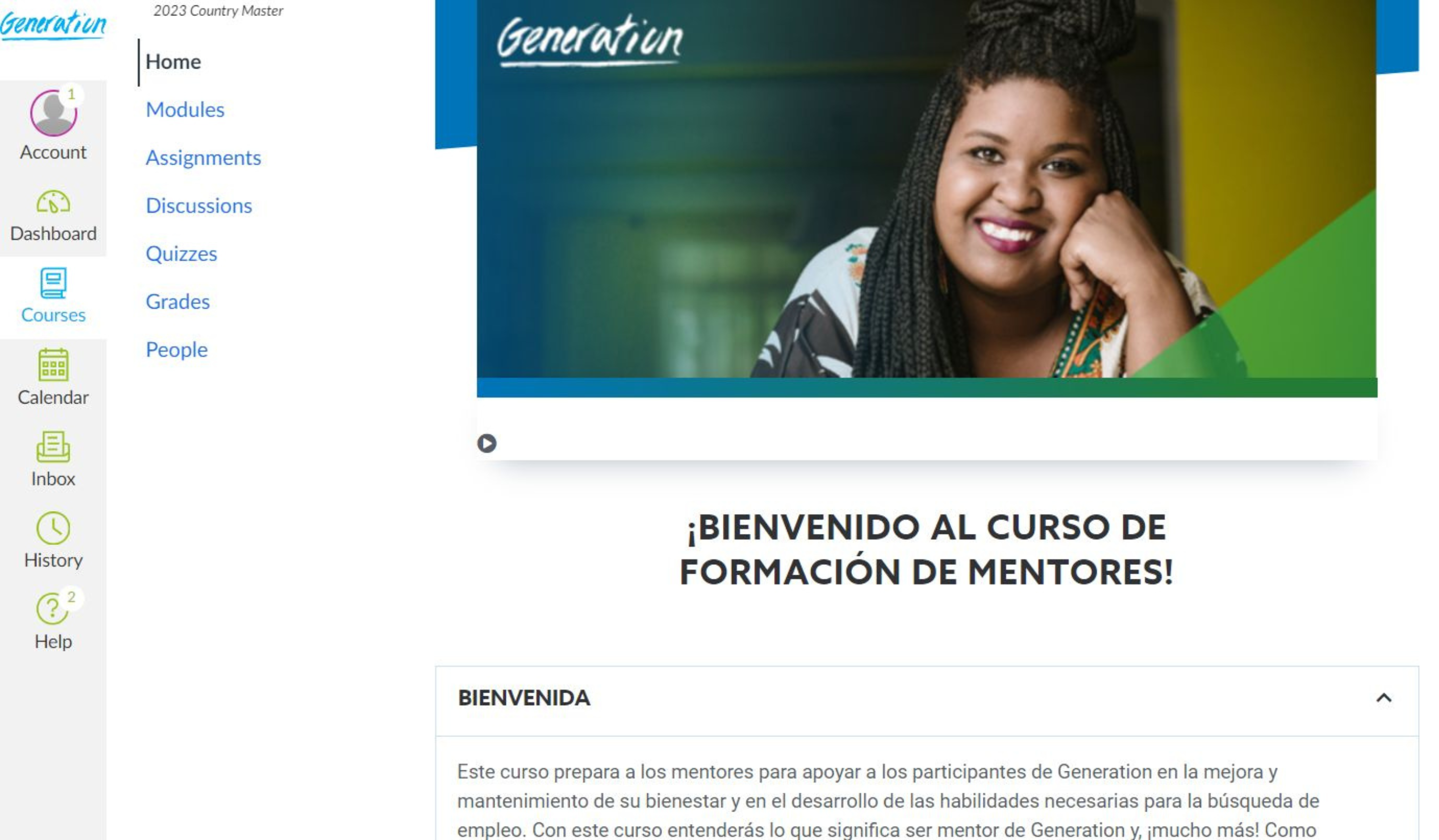Mentorship Matters: Key Learnings from Generation Europe

“Before Generation, I struggled with confidence. Not getting jobs makes you question yourself. But with Generation, I received personal support and one-to-one time with my mentor. My mentor believed in me, even encouraged me when I doubted myself.” – Barbara, Generation UK graduate
Barbara’s life transformed after joining Generation UK’s Retrofit program. Mentorship, alongside a mix of people and technical skills, helped her build confidence and also develop the skills she needed for professional success. This is a distinctive aspect of support provided by Generation – to equip our learners with both technical and people skills, behaviours, and mindsets, in order to increase their chances of success when looking for employment post-graduation.
At Generation, our comprehensive approach involves a seven-step methodology designed to systematically and holistically address the obstacles that job seekers face when looking for employment, and mentorship is one of the key pillars among these seven steps.

The focus of mentorship differs across our country affiliates and it is designed to meet learner needs which are individualised and contextualised to the society and culture that they belong to.
Our Mentorship Provision in Europe
Our mentorship provision across France, Italy, Spain, the United Kingdom, and Ireland includes social support, employability coaching, and placement support depending on learner needs.
This is in line with what we observe in other similar workforce development programs and initiatives in Europe, led by organisations such as Collectif Mentorat, which Generation France has recently joined, and Mentoring Europe. These organisations also emphasise the importance of mentorship in employability, personal development, and social inclusion. Across Europe, mentorship organisations adapt their programs to meet the unique needs of their target populations. Generation is a proud contributor to the European mentorship movement, hoping to learn from peer organisations as well as sharing our wide-ranging experiences and track record.
While our objectives and learner-centric philosophy are the same, unique to Generation is our global scope and data-driven approach. Integrated into a structured framework, we collect and analyse data to optimise mentorship and ensure long-term outcomes. This evidence-based method makes our programs effective, scalable, and adaptable across different labour markets.
Our Theory of Change for Mentorship
Mentorship is often quoted as part of learner’s stories of trajectory change, and our experience leads us to believe that mentorship is indeed necessary and transformational. At Generation, we strive to go beyond the qualitative understanding of impact, to quantitatively measure how mentorship has enabled our learners’ success. Below is our approach to impact measurement.
We have since conducted global research, supported by the Macquarie Group Foundation, to validate this theory of change. We have over 2,600 learners as part of this specific sample size, spanning 11 different countries across Europe, APAC, SAMEA and LatAm.
Our key takeaways are as follows:
1. Mentorship is not just good to have, but essential
Learners are not only happy with the mentorship provided by Generation, but consider it critical in their ability to be successful both during and after the program.

While a good 89% of learners globally and 87% in Europe are satisfied with mentorship, it is noteworthy that a majority (94%) considers it critical for program completion. These numbers are higher for our European learners – a large 88% indicating that it would have been difficult to complete the program without employability-based coaching. European learners especially find employability coaching and social support vital to their success.
“The fact that I was accompanied throughout the process mattered the most to me.” – Hana, Generation France graduate
2. The quality of mentorship matters
Learners who received high quality mentorship displayed a greater depth of impact.
In particular, compared to learners who perceive low quality of mentorship received (i.e., dissatisfaction with mentorship), learners who perceive high quality of mentorship: Are significantly more likely to identify as ready for employment Achieve better well-being outcomes on confidence and optimism Are more likely to gain employment post-program
“I appreciated the individual guidance from mentors. They helped me to apply my skills and navigate a new career path.” – Pamela, Generation Italy graduate
3. Think globally, design locally
We should design mentorship programs to meet unique local needs, while adapting the global best practices and tools available where it is relevant. In Europe, teams have successfully adapted shared resources. For instance, our Generation UK and Ireland teams developed a mentor training course, which has since been translated and tailored for our operations in France, Spain, and Italy – enabled by the support of Workday Foundation.

Bettering Our Best
Mentorship makes a measurable difference in our learners’ lives, and both data and lived experience validate this finding. These insights provide us with a compelling case to continually improve mentorship quality. This will require ongoing investment in mentorship, from onboarding, performance management, to mentor upskilling.
But this journey doesn’t happen in isolation, since mentorship has been growing in visibility in Europe. The recent national-level and pan-European initiatives, such as Mentoring Europe, give us the opportunity to share our unique data-driven approach and insights, as well as to learn from organisations and initiatives across the region in order to strive towards higher quality support.
By coming together as an ecosystem, we amplify our ability to make mentorship not just a support mechanism, but a transformative force in people’s lives and in the lives of their family members.
Going Further Together
Mentorship is a cornerstone of Generation’s approach, bridging the gap between technical training and the personal support learners need to succeed. To further boost mentorship-related outcomes across Europe, we advocate for greater collaboration within the mentorship ecosystem.
Mentorship matters! And through collaboration its impact can reach even greater heights.